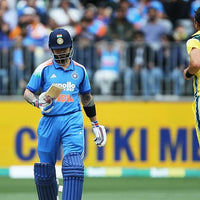Midway through that final over at the Wankhede Stadium on Sunday night, it would have been fascinating to peep inside Hardik Pandya’s mind. As he stood at the top of his bowling mark, what wasHardik Pandya thinking? The man he was preparing to bowl to wasn’t just anyone. If Pandya today is captain of Mumbai Indians and one of cricket’s most marketable stars, it’s because of MS Dhoni and the calm advice he received in the cauldron of the Chinnaswamy Stadium in Bengaluru eight years ago.
Make no mistake, had India lost that World T20 match to Bangladesh, Pandya’s international career would have been over. India would have been out of the tournament, and the public outrage and desire for blood-letting would have claimed him as the obvious victim. In a topsy-turvy game where India had scored a below-par 146, Dhoni had mixed and matched his bowlers right through to somehow keep India in the game. But with Jasprit Bumrah, then not the force of today, and Ashish Nehra having bowled out, Pandya was the only pace option he could turn to.
His first two overs had gone for 20, and when Mahmadullah Riyad and a pumped-up Mushfiqur Rahim took nine off the first three balls, India were on the verge of being kicked out of their own party. Bangladesh needed just two off the final three balls, with four wickets in hand. It was then that Dhoni left his station behind the stumps and engaged in lengthy discussions with his bowler. India were way behind the over-rate and a fine was almost certain, but Dhoni didn’t care.
Hardik Pandya had played just 13 T20Is prior to that, taking 11 wickets in 33.3 overs. He was capable of pushing the speed gun past 140 km/hr and bowling a heavy ball, but the situation was no longer about his skill-set. In that tinder-box atmosphere, Dhoni knew that the match would be decided by who could stay most calm. He made sure that he eked out every second needed to allow Pandya to get his bearings again.
The finale is now remembered for Dhoni taking a glove off and sprinting to the stumps to run out Mustafizur Rahman, thus sealing a one-run win, but the manner in which Hardik Pandya executed what he was told to do was equally praiseworthy. Those three balls were, in a sense, the making of him as an international cricketer.
Did those images flash through Pandya’s mind before he ran in to bowl to his first captain? His words in the post-match interaction – “There’s a man behind the stumps who tells them what’s working” – spoke volumes about the respect he still has for Dhoni, and could also perhaps be seen as an indictment of how Mumbai’s new on-field brains trust has yet to gel.
As for Dhoni, whose hand-holding probably saved Pandya’s career, he seemed to know exactly what was coming. But for the last ball, which he miscued while trying to slap too hard, it was as though he was two steps ahead. Wide ball in the slot. Long-off. Too straight. Smashed to long-on. Attempted yorker-turned-full toss. Clubbed over square leg. Pandya is 30 and an IPL veteran himself, but he simply had no answers against the Big Daddy of them all.
On a long-ago April night in 2011, a woefully out-of-form Dhoni promoted to No. 5 in a World Cup final. The six he hit over long-on to end the game is perhaps the most-watched sports clips in history. On Sunday, with Mumbai needing just over two runs a ball to win – perfectly achievable in this day and age – Pandya also walked in at No. 5. His six-ball 2 killed any momentum the innings had, and Mumbai finished 20 short.
Hardik Pandya will come again. He’s far too good a cricketer not to. Like Dhoni, he seems to have absorbed the biggest lesson of all – it’s just a sport, not life and death. But Sunday offered a sobering reminder of just how much further he has to go to earn Dhoni-like levels of respect and adulation. As in Bengaluru eight years ago, he’ll be a better cricketer if he absorbs the lesson.
For the Latest Sports News: Click Here







